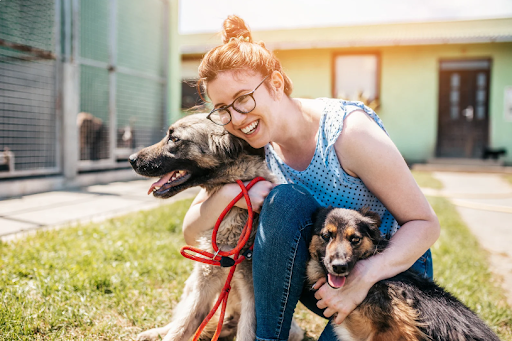Adopted or Rescued Dogs: Overcoming Behavioural Challenges With Patience & Love

Owning a rescue dog can be an extremely rewarding experience, but it does come with challenges too. Whether you are a new owner of a rescue dog or a seasoned trainer we hope this guide will be useful to help you successfully rehabilitate and integrate your new canine into your home.
Rescue dogs often have an unknown history and can come with behavioural issues that are closely related to their pasts. This can hinder the training process, but with the right techniques, we can help you navigate those challenges and help your dog thrive. The main thing to remember when training a rescue dog is to focus on positive reinforcement as this will help to build a strong relationship with them. They have probably had a traumatic past, so telling them off may be detrimental to your training.
Understanding The Challenges
Rescue dogs often have behavioural problems, possibly resulting from past experiences of abuse or neglect, so it is essential to understand these challenges to create a training program that is suitable for their specific needs.
Behaviours they may show include fear, aggression, and anxiety, which could be a result of an abusive past or a lack of socialisation. They simply may not understand how to interact with other humans or dogs. Rescue dogs should be trained with compassion and patience, and using reward-based training will help them develop trust and confidence in you as their owner / trainer.
It is really important to take things back to basics with rescue dogs. They probably haven’t been taught simple obedience skills or even manners, so this can be hard when you start the training process. With consistent commands and rewards, rescue dogs can learn obedience fairly quickly and become well-behaved pets.
Dealing With Out-Of-Control Behaviour
Some rescue dogs may have been left to their own devices and are therefore likely to engage in destructive or attention-seeking behaviours. Impulse control may be something they struggle with too. Let’s have a look at some ways that you can overcome this out-of-control behaviour.
1. Hyperactive dogs
Hyperactive dogs can often be quite a handful as the excess energy they have can turn into destructive behaviour. This can look like chewing furniture, digging holes, or constantly jumping on people. It is really important if your dog is displaying any of these behaviours to allow them to have an outlet for their energy. Regular exercise (long walks) or interactive playtime can help them channel their energy in a positive way.
2. Attention-seeking behaviour
Rescue dogs often crave attention after being neglected for so long, and this often shows itself in excessive barking, jumping, or even aggression. Training methods that work on impulse control can help here, teaching the dog to develop patience. Teaching basic obedience commands will improve their overall behaviour.
3. Providing mental stimulation
A lack of mental stimulation can often cause hyperactivity in dogs, so try to keep your rescue dog’s mind busy with puzzle toys, interactive games, and even obedience training exercises. The more you can tire them out mentally the better! Providing them with challenges can help redirect their energy and keep them mentally occupied.
4. Seeking professional help
In some cases, seeking help from a professional dog trainer might be necessary, as they have the expert knowledge and experience to help work through specific behavioural problems. Here at WitsEnd we can create customised training plans and guidance to help you work through the needs of your individual rescue dog, providing invaluable support. By implementing effective training techniques and addressing the root causes of your dog’s behaviour, we can work together to help your furry companion become a well-balanced, good-natured member of the family.
For tailored advice and training sessions, our expert team at WitsEnd is on hand. Working with people from all over the country, we have had over 2000 success stories! To book an appointment or for more information, please call us on 0116 244 2455.